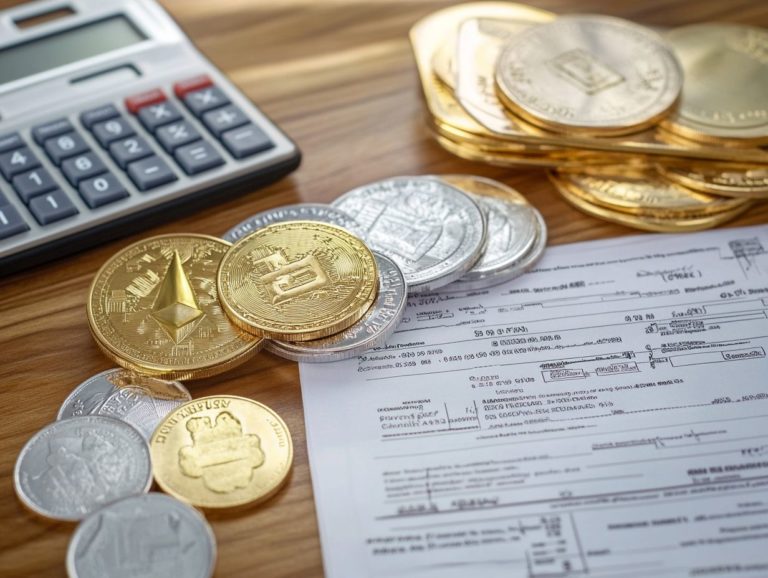How to Stay Compliant with Precious Metals Tax Laws
Understanding precious metals can be exciting but complicated, especially when it comes to grasping the tax laws that govern these valuable assets.
Whether you’re a seasoned investor or just starting your investment journey, it s crucial to know what qualifies as a precious metal and the specific tax implications tied to buying and selling these assets.
This article explores essential topics such as IRS reporting guidelines, capital gains tax, and practical advice to ensure you remain compliant.
Arm yourself with the knowledge necessary to manage your investments astutely and sidestep any potential pitfalls.
Contents
- Key Takeaways:
- Understanding Precious Metals Tax Laws
- Reporting Requirements for Precious Metals
- Tax Implications of Buying and Selling Precious Metals
- Tips for Staying Compliant with Precious Metals Tax Laws
- Frequently Asked Questions
- How do I know if I need to pay taxes on my precious metals?
- What are the consequences of not staying compliant with precious metals tax laws?
- Do I need to report my precious metal holdings to the IRS?
- What are some tips for staying compliant with precious metals tax laws?
- Are there any tax breaks or exemptions for precious metals?
- What resources are available to help me stay compliant with precious metals tax laws?
Key Takeaways:
- Keep accurate records of all precious metals transactions to ensure compliance with tax laws.
- Be aware of IRS and state reporting requirements for precious metals to avoid penalties and fines.
- Consider working with a tax professional to navigate the complex tax implications of buying and selling precious metals.
Understanding Precious Metals Tax Laws
Understanding the intricacies of precious metals tax laws is essential for you as an investor. These regulations determine how capital gains tax, reporting requirements, and tax advantages affect your investments in physical gold, silver, platinum, and palladium.
The tax implications can profoundly influence your investment portfolio and overall financial decisions. Thus, it is vital for you to comprehend the diverse tax landscape for precious metals in the next decade surrounding these precious metals.
Working with a tax professional offers valuable insights into tax planning and ensures adherence to IRS regulations, guiding you through potential tax liabilities and maximizing tax efficiency in your investment strategies, especially when it comes to tax reporting for precious metals investments.
What are Precious Metals?
Precious metals like gold, silver, platinum, and palladium possess intrinsic value and are widely regarded as valuable assets. They are frequently featured in investment portfolios for their stability and potential for financial growth.
These metals stand out due to their rarity, durability, and resistance to corrosion, enhancing their enduring appeal. During times of economic uncertainty and market volatility, savvy investors often gravitate toward these assets, as they typically maintain their value when other securities may struggle.
Market fluctuations can significantly impact the prices of precious metals, influenced by factors such as geopolitical tensions, inflation, and shifts in supply and demand. By incorporating these assets into your investment strategy, you can effectively mitigate risks while boosting your potential for returns, ultimately crafting a more diversified and resilient investment approach.
Overview of Tax Laws for Precious Metals
An overview of tax laws for precious metals reveals that your transactions involving these assets are subject to specific regulations, including capital gains tax. This tax varies based on the holding period and type of metal, as outlined by IRS guidelines.
For example, gold and silver are classified differently, with long-term holdings potentially benefiting from lower tax rates compared to short-term sales. You should also be mindful of exemptions, such as those applicable to collectibles, which can lead to higher rates. Additionally, understanding tax credits related to precious metals can provide further insights into maximizing your investment benefits.
When selling these metals, there are specific reporting requirements, including the necessity to file Form 1099-B for transactions that exceed a certain threshold. It’s essential to understand the tax implications of buying and selling precious metals, as tax evasion or non-compliance with reporting laws can result in significant fines and penalties, jeopardizing your financial gains from these investments.
Reporting Requirements for Precious Metals
The reporting requirements for precious metals transactions are crucial for ensuring compliance with IRS regulations. You must maintain meticulous records that facilitate precise tax reporting, helping you steer clear of potential financial penalties associated with non-compliance.
IRS Reporting Guidelines
IRS reporting guidelines provide essential documentation for precious metal transactions. This helps you navigate tax implications and avoid potential liabilities.
If you re investing in gold, silver, platinum, or other precious metals, understanding forms like Form 1099-B is crucial. This form provides detailed reports on the sale of these assets, making it an essential part of your financial toolkit.
Tracking the cost basis of your holdings is vital. The cost basis refers to the original value of an investment, allowing you to accurately report any gains or losses. Proper record-keeping isn t just a best practice; it s a necessity for compliance with IRS regulations.
Don’t risk hefty penalties; maintain your documentation diligently! Neglecting to keep adequate records could result in significant fines and even legal troubles. By adhering to these guidelines, especially when navigating complex tax issues in precious metals investments, you’ll simplify your tax filing process while protecting your financial interests.
State Reporting Requirements
State reporting requirements for precious metals can vary significantly. It s vital to understand the local tax policies and compliance mandates in your area.
This variation can lead to different financial implications based on your location, affecting the overall cost of your investment. For example, states with stringent regulations may create hurdles that could discourage potential buyers or reduce trading volume.
You ll need to navigate these complexities carefully to avoid unforeseen penalties or losses. Staying updated on changes in local laws helps you remain compliant. It can also refine your investment strategies.
By understanding these nuances, you can make informed decisions, maximizing your returns while minimizing legal risks.
Tax Implications of Buying and Selling Precious Metals
When considering the purchase and sale of precious metals, understanding the tax implications is crucial. You may encounter capital gains tax on any profits realized, as well as potential sales tax on your purchases.
These factors can significantly impact your overall investment strategy and financial results, making it essential to plan accordingly.
Capital Gains Tax
Capital gains tax is a key factor for you to consider as an investor. It applies to the profits made when selling these assets and can fluctuate based on how long you hold them.
Understanding the difference between short-term and long-term capital gains rates is important for maximizing your returns. Typically, holding your investments for more than a year subjects them to lower long-term rates, which can significantly enhance your profitability.
As you navigate the intricacies of capital gains tax, consider exploring tax-loss harvesting. This strategy involves selling losing investments to offset gains, effectively reducing your tax burden.
Carefully timing your purchases and sales can minimize your overall tax implications while seizing market opportunities. This strategy can make your investment journey more efficient and rewarding.
Sales Tax
Sales tax adds another layer of complexity to precious metals transactions. It varies from one state to another and often depends on the type of metal and the nature of the deal.
Some states may impose higher tax rates on bullion and coins, while others offer exemptions for specific purchases, such as investment-grade metals or items intended for resale. Understanding the tax implications of selling your precious metals collection can profoundly influence your buying decisions.
As a savvy investor, consider minimizing your tax burden by choosing a jurisdiction with favorable tax policies. Jurisdictions that permit exemptions can create opportunities for more tax-efficient investing, ultimately boosting your long-term returns.
By staying informed about the nuances of sales tax in your area, you can strategically tailor your investments in precious metals to align with your financial goals and state requirements.
Tips for Staying Compliant with Precious Metals Tax Laws
To remain compliant with precious metals tax laws, adopt a proactive approach. This involves meticulous record-keeping, a clear understanding of reporting requirements, and often seeking guidance from a tax professional to navigate the complexities of your tax obligations.
Keeping Accurate Records
Keeping accurate records is essential for fulfilling tax reporting requirements related to precious metals. These records provide the necessary documentation to substantiate your capital gains and comply with IRS regulations.
You should prioritize maintaining a comprehensive collection of essential documents, including purchase receipts that detail your acquisition costs and sales documentation that reflects the profits you’ve made. Additionally, understanding the tax regulations for precious metals in retirement accounts can ensure that any correspondence related to trades or investments can also serve as invaluable evidence during an audit.
By being diligent in your record-keeping, you not only simplify your tax preparation process but also position yourself for effective long-term tax planning!
Well-organized records can lead to potential deductions and credits, ensuring you are following tax laws while ultimately safeguarding your financial interests.
Working with a Tax Professional
Engaging with a tax professional can offer you invaluable investment guidance, particularly when it comes to understanding the tax rules tied to precious metals. This partnership ensures compliance while optimizing your tax efficiency.
Beyond merely helping you grasp the nuances of capital gains and losses, a seasoned expert can develop personalized tax strategies tailored specifically to your investment portfolio. Their expertise extends to managing the intricate reporting requirements associated with trading or holding precious metals, including how to stay compliant with precious metals tax regulations.
This significantly reduces the chances of costly errors! A tax professional will inform you about the latest tax laws and regulatory changes that could impact your investments, including tax considerations for importing precious metals. This level of insight gives you the power to make well-informed financial decisions, potentially maximizing your profits while minimizing your liability, an essential consideration in a fluctuating market.
Frequently Asked Questions
How do I know if I need to pay taxes on my precious metals?
Wondering if you need to pay taxes on your precious metals? If you sell them for a profit, the answer is yes! The amount of taxes you need to pay will depend on your individual tax bracket and the type of precious metal you are selling. It’s best to consult with a tax professional for specific guidance.
What are the consequences of not staying compliant with precious metals tax laws?
If you do not stay compliant with precious metals tax laws, you may face penalties, fines, and possible legal action from the government. Stay informed to protect yourself!
Do I need to report my precious metal holdings to the IRS?
Yes, you are required to report your precious metal holdings to the IRS if their value exceeds a certain threshold. For example, if you own over $10,000 worth of gold coins, you will need to report this on your tax return.
What are some tips for staying compliant with precious metals tax laws?
It’s important to keep detailed records of all purchases and sales of precious metals. This will make it easier to accurately report your gains or losses on your tax return.
It’s also recommended to work with a tax professional who is knowledgeable about precious metals tax laws!
Are there any tax breaks or exemptions for precious metals?
Yes, certain types of precious metals may qualify for special tax breaks or exemptions. For example, certain gold coins may be considered collectibles and be subject to a lower tax rate. Again, it’s best to consult with a tax professional for specific guidance.
What resources are available to help me stay compliant with precious metals tax laws?
The IRS website offers information on precious metals tax laws, and there are also various online resources and forums dedicated to discussing and understanding these laws. It’s important to stay informed and seek professional guidance when needed to ensure compliance!
Contact a tax professional today to maximize your investment returns!














